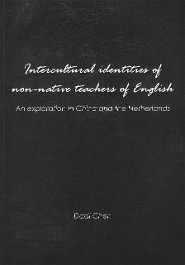
Chinese and Dutch Teachers of English have different opinions about cultures associated with the English language
Teachers of English as a foreign language in China and the Netherlands have different notions of themselves as teachers in relation to cultures associated with the English language. This is stated in the doctoral thesis of Dadi Chen, who graduates from the Leiden University Graduate School of Teaching (ICLON) on 6 December 2017.
English is the most important foreign language in secondary education, in both China and the Netherlands. Teachers in both countries can have diverse ideas about language-and-culture teaching, and they may have different notions of their own role in this respect. This research shows that the so-called intercultural identities of Chinese and Dutch teachers are different. Intercultural identity refers to a person's attachment to two or more cultural groups.
Impartiality

Both the Chinese and the Dutch teachers maintain a strong affiliation to their own cultures. They try to be impartial in culture teaching, because they regard it as important to consider cultures to be equal and to avoid imposing their own ideas on students.
Compared with Dutch teachers, Chinese teachers place less emphasis on the importance of being impartial in relation to English cultures, and they are more likely to highlight only the positive sides of cultures than are the Dutch teachers. For both groups of teachers, such differences were found to be more closely connected to their nationality than to other background variables, such as gender and years of teaching experience.
When teachers attach great value to traditions in their own culture and to status and power, they are less likely to feel open and be able to deal with cultural differences. In addition, the more teachers are willing to help others (in this case, their students), the more likely they are to support impartial positions when teaching about cultures and to avoid imposing their ideas on students. These connections are more obvious among Dutch teachers than Chinese teachers.
Differences
This research was focused on so-called non-native teachers of English, for whom English is a foreign language. These teachers comprise the majority of English teachers worldwide, and they are likely to have learned about the English language and cultures in their home countries. These teachers may experience differences between their home cultures and the cultures of English-speaking countries.
Furthermore, these teachers may unconsciously pass on their own opinions and attitudes towards ES cultures while referring to these cultures in their lessons. This implies that teachers need to be aware of their own intercultural identities in order to consciously promote unbiased understanding between cultures. In this respect, the findings and instruments from this research can be interesting for teacher education and teacher training programmes.
Photo: China Photos / Getty Images News / Getty Images / Universal Images Group
Research method
Based on a literature review and exploratory interviews, Chen conducted a questionnaire survey among 114 Chinese and 154 Dutch secondary school teachers of English. To investigate the connections between cultural values and identity perceptions, Chen adopted the English version of the Portrait Values Questionnaire, developed by the psychologist Shalom Schwartz, on basic values that people in different cultures all over the world attach importance to.
